ECE304 - Technology and Young Children: Addressing Key Issues
VerifiedAdded on 2023/06/03
|13
|4248
|315
Essay
AI Summary
This essay discusses the adverse effects of technology on the mental and physical well-being of young children, emphasizing the importance of parental involvement and the role of early childhood professionals in addressing this issue. It highlights the shift from traditional play to screen-based activities, leading to decreased creativity, reduced outdoor time, and potential health problems like eye strain, sleep disorders, and obesity. The essay also touches on the impact of technology on children's social and emotional development, cognitive abilities, and the potential for addiction and dependency. It suggests strategies for parents and educators to limit screen time, promote social interaction, and foster a balanced approach to technology use, ensuring children develop into well-rounded individuals. The document is contributed by a student and available on Desklib, a platform offering study tools and resources for students.
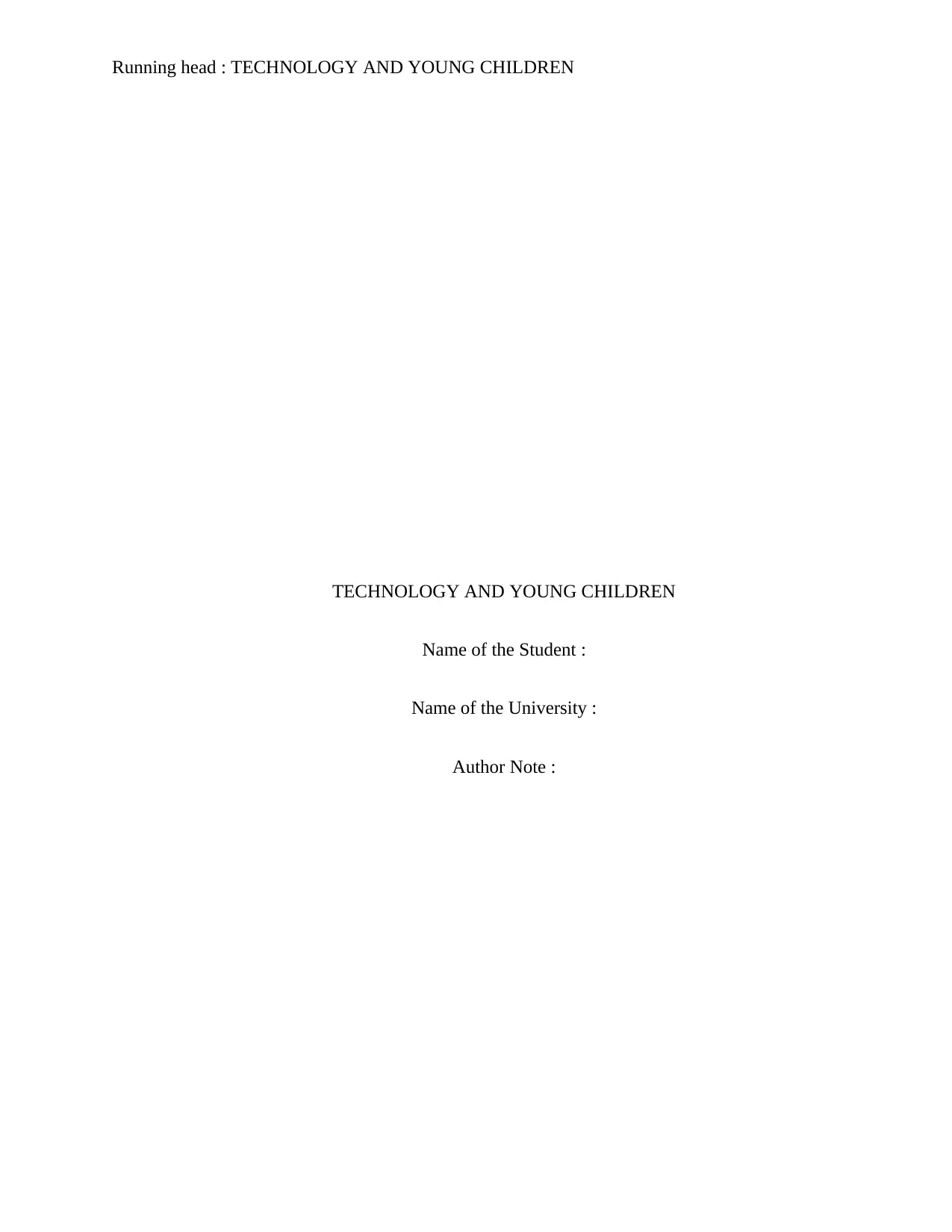
Running head : TECHNOLOGY AND YOUNG CHILDREN
TECHNOLOGY AND YOUNG CHILDREN
Name of the Student :
Name of the University :
Author Note :
TECHNOLOGY AND YOUNG CHILDREN
Name of the Student :
Name of the University :
Author Note :
Paraphrase This Document
Need a fresh take? Get an instant paraphrase of this document with our AI Paraphraser
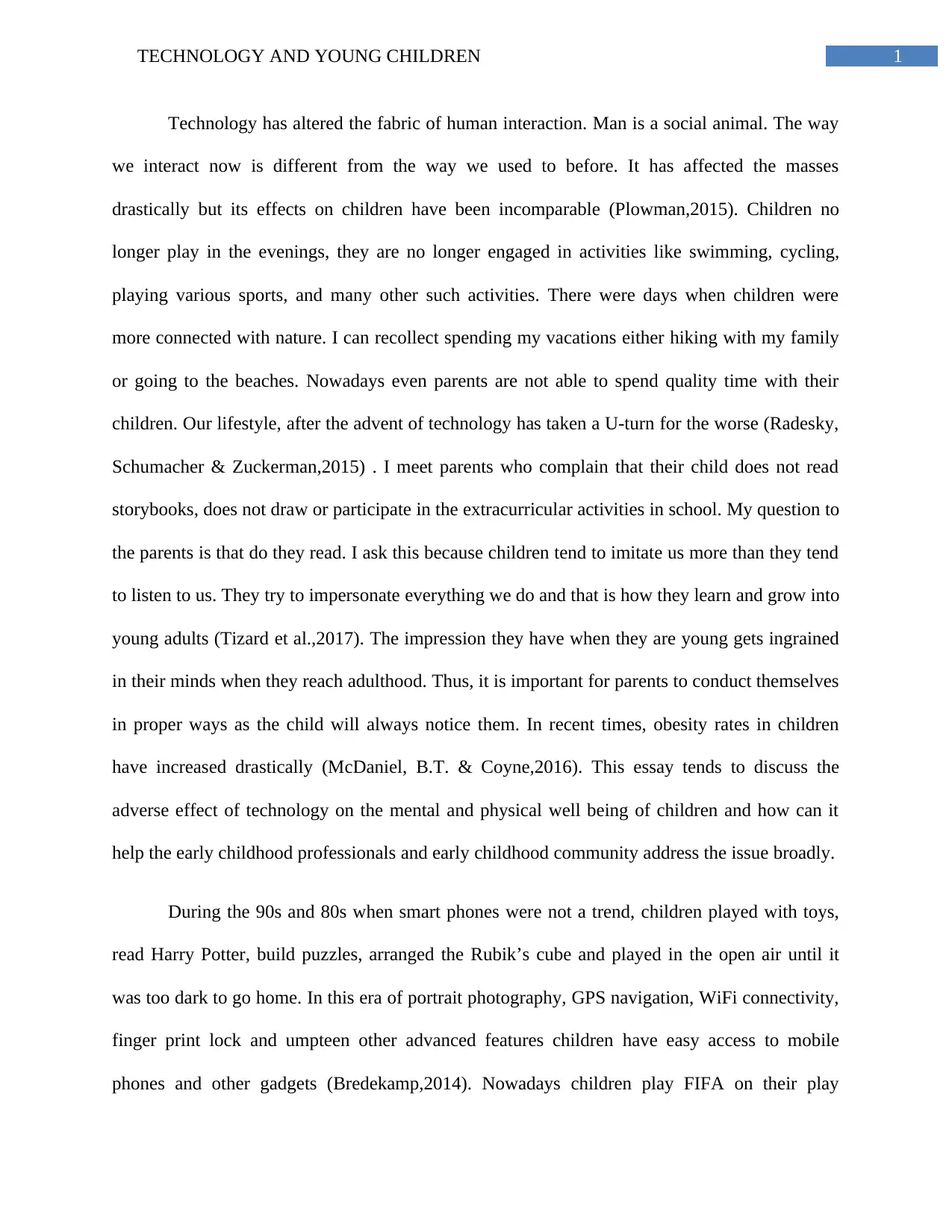
1TECHNOLOGY AND YOUNG CHILDREN
Technology has altered the fabric of human interaction. Man is a social animal. The way
we interact now is different from the way we used to before. It has affected the masses
drastically but its effects on children have been incomparable (Plowman,2015). Children no
longer play in the evenings, they are no longer engaged in activities like swimming, cycling,
playing various sports, and many other such activities. There were days when children were
more connected with nature. I can recollect spending my vacations either hiking with my family
or going to the beaches. Nowadays even parents are not able to spend quality time with their
children. Our lifestyle, after the advent of technology has taken a U-turn for the worse (Radesky,
Schumacher & Zuckerman,2015) . I meet parents who complain that their child does not read
storybooks, does not draw or participate in the extracurricular activities in school. My question to
the parents is that do they read. I ask this because children tend to imitate us more than they tend
to listen to us. They try to impersonate everything we do and that is how they learn and grow into
young adults (Tizard et al.,2017). The impression they have when they are young gets ingrained
in their minds when they reach adulthood. Thus, it is important for parents to conduct themselves
in proper ways as the child will always notice them. In recent times, obesity rates in children
have increased drastically (McDaniel, B.T. & Coyne,2016). This essay tends to discuss the
adverse effect of technology on the mental and physical well being of children and how can it
help the early childhood professionals and early childhood community address the issue broadly.
During the 90s and 80s when smart phones were not a trend, children played with toys,
read Harry Potter, build puzzles, arranged the Rubik’s cube and played in the open air until it
was too dark to go home. In this era of portrait photography, GPS navigation, WiFi connectivity,
finger print lock and umpteen other advanced features children have easy access to mobile
phones and other gadgets (Bredekamp,2014). Nowadays children play FIFA on their play
Technology has altered the fabric of human interaction. Man is a social animal. The way
we interact now is different from the way we used to before. It has affected the masses
drastically but its effects on children have been incomparable (Plowman,2015). Children no
longer play in the evenings, they are no longer engaged in activities like swimming, cycling,
playing various sports, and many other such activities. There were days when children were
more connected with nature. I can recollect spending my vacations either hiking with my family
or going to the beaches. Nowadays even parents are not able to spend quality time with their
children. Our lifestyle, after the advent of technology has taken a U-turn for the worse (Radesky,
Schumacher & Zuckerman,2015) . I meet parents who complain that their child does not read
storybooks, does not draw or participate in the extracurricular activities in school. My question to
the parents is that do they read. I ask this because children tend to imitate us more than they tend
to listen to us. They try to impersonate everything we do and that is how they learn and grow into
young adults (Tizard et al.,2017). The impression they have when they are young gets ingrained
in their minds when they reach adulthood. Thus, it is important for parents to conduct themselves
in proper ways as the child will always notice them. In recent times, obesity rates in children
have increased drastically (McDaniel, B.T. & Coyne,2016). This essay tends to discuss the
adverse effect of technology on the mental and physical well being of children and how can it
help the early childhood professionals and early childhood community address the issue broadly.
During the 90s and 80s when smart phones were not a trend, children played with toys,
read Harry Potter, build puzzles, arranged the Rubik’s cube and played in the open air until it
was too dark to go home. In this era of portrait photography, GPS navigation, WiFi connectivity,
finger print lock and umpteen other advanced features children have easy access to mobile
phones and other gadgets (Bredekamp,2014). Nowadays children play FIFA on their play
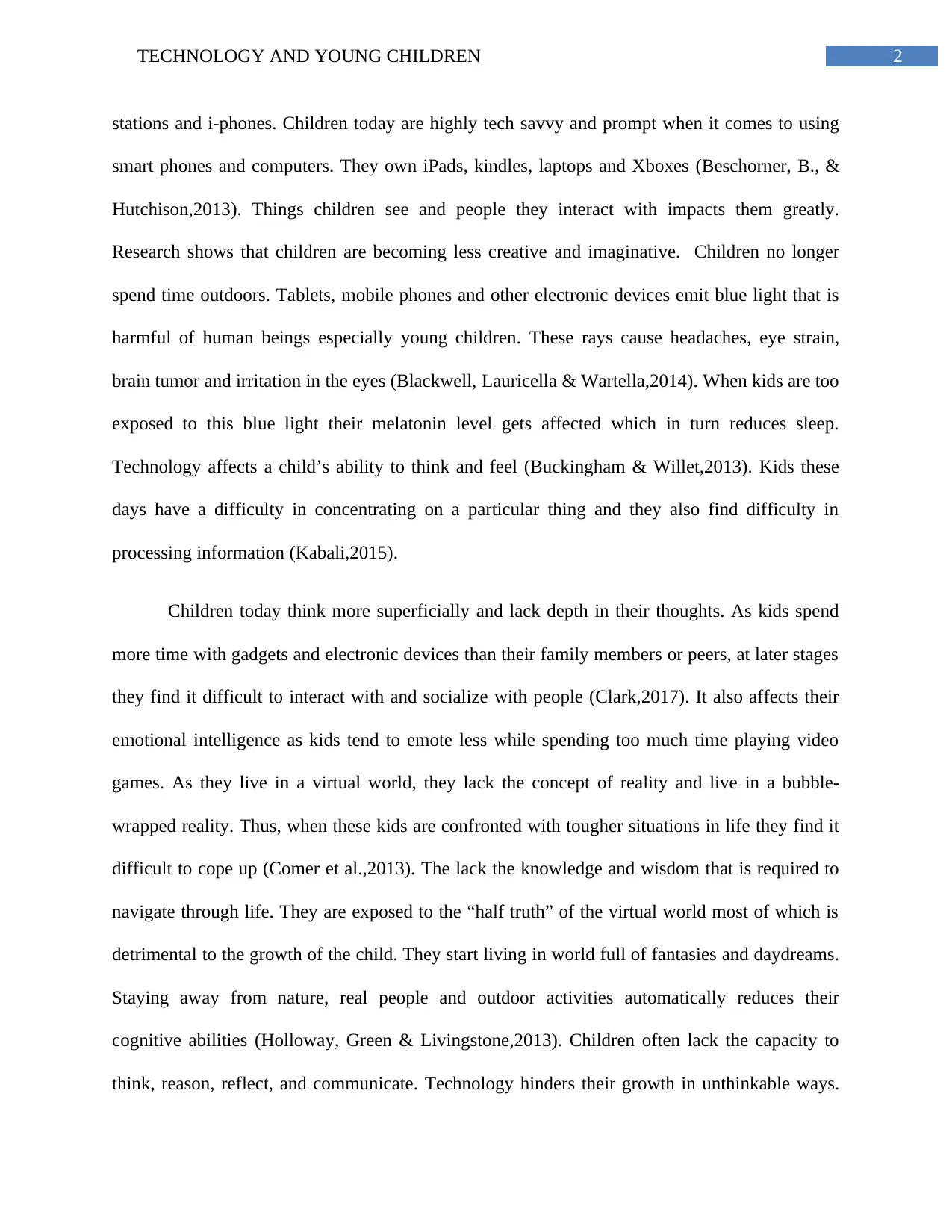
2TECHNOLOGY AND YOUNG CHILDREN
stations and i-phones. Children today are highly tech savvy and prompt when it comes to using
smart phones and computers. They own iPads, kindles, laptops and Xboxes (Beschorner, B., &
Hutchison,2013). Things children see and people they interact with impacts them greatly.
Research shows that children are becoming less creative and imaginative. Children no longer
spend time outdoors. Tablets, mobile phones and other electronic devices emit blue light that is
harmful of human beings especially young children. These rays cause headaches, eye strain,
brain tumor and irritation in the eyes (Blackwell, Lauricella & Wartella,2014). When kids are too
exposed to this blue light their melatonin level gets affected which in turn reduces sleep.
Technology affects a child’s ability to think and feel (Buckingham & Willet,2013). Kids these
days have a difficulty in concentrating on a particular thing and they also find difficulty in
processing information (Kabali,2015).
Children today think more superficially and lack depth in their thoughts. As kids spend
more time with gadgets and electronic devices than their family members or peers, at later stages
they find it difficult to interact with and socialize with people (Clark,2017). It also affects their
emotional intelligence as kids tend to emote less while spending too much time playing video
games. As they live in a virtual world, they lack the concept of reality and live in a bubble-
wrapped reality. Thus, when these kids are confronted with tougher situations in life they find it
difficult to cope up (Comer et al.,2013). The lack the knowledge and wisdom that is required to
navigate through life. They are exposed to the “half truth” of the virtual world most of which is
detrimental to the growth of the child. They start living in world full of fantasies and daydreams.
Staying away from nature, real people and outdoor activities automatically reduces their
cognitive abilities (Holloway, Green & Livingstone,2013). Children often lack the capacity to
think, reason, reflect, and communicate. Technology hinders their growth in unthinkable ways.
stations and i-phones. Children today are highly tech savvy and prompt when it comes to using
smart phones and computers. They own iPads, kindles, laptops and Xboxes (Beschorner, B., &
Hutchison,2013). Things children see and people they interact with impacts them greatly.
Research shows that children are becoming less creative and imaginative. Children no longer
spend time outdoors. Tablets, mobile phones and other electronic devices emit blue light that is
harmful of human beings especially young children. These rays cause headaches, eye strain,
brain tumor and irritation in the eyes (Blackwell, Lauricella & Wartella,2014). When kids are too
exposed to this blue light their melatonin level gets affected which in turn reduces sleep.
Technology affects a child’s ability to think and feel (Buckingham & Willet,2013). Kids these
days have a difficulty in concentrating on a particular thing and they also find difficulty in
processing information (Kabali,2015).
Children today think more superficially and lack depth in their thoughts. As kids spend
more time with gadgets and electronic devices than their family members or peers, at later stages
they find it difficult to interact with and socialize with people (Clark,2017). It also affects their
emotional intelligence as kids tend to emote less while spending too much time playing video
games. As they live in a virtual world, they lack the concept of reality and live in a bubble-
wrapped reality. Thus, when these kids are confronted with tougher situations in life they find it
difficult to cope up (Comer et al.,2013). The lack the knowledge and wisdom that is required to
navigate through life. They are exposed to the “half truth” of the virtual world most of which is
detrimental to the growth of the child. They start living in world full of fantasies and daydreams.
Staying away from nature, real people and outdoor activities automatically reduces their
cognitive abilities (Holloway, Green & Livingstone,2013). Children often lack the capacity to
think, reason, reflect, and communicate. Technology hinders their growth in unthinkable ways.
⊘ This is a preview!⊘
Do you want full access?
Subscribe today to unlock all pages.

Trusted by 1+ million students worldwide
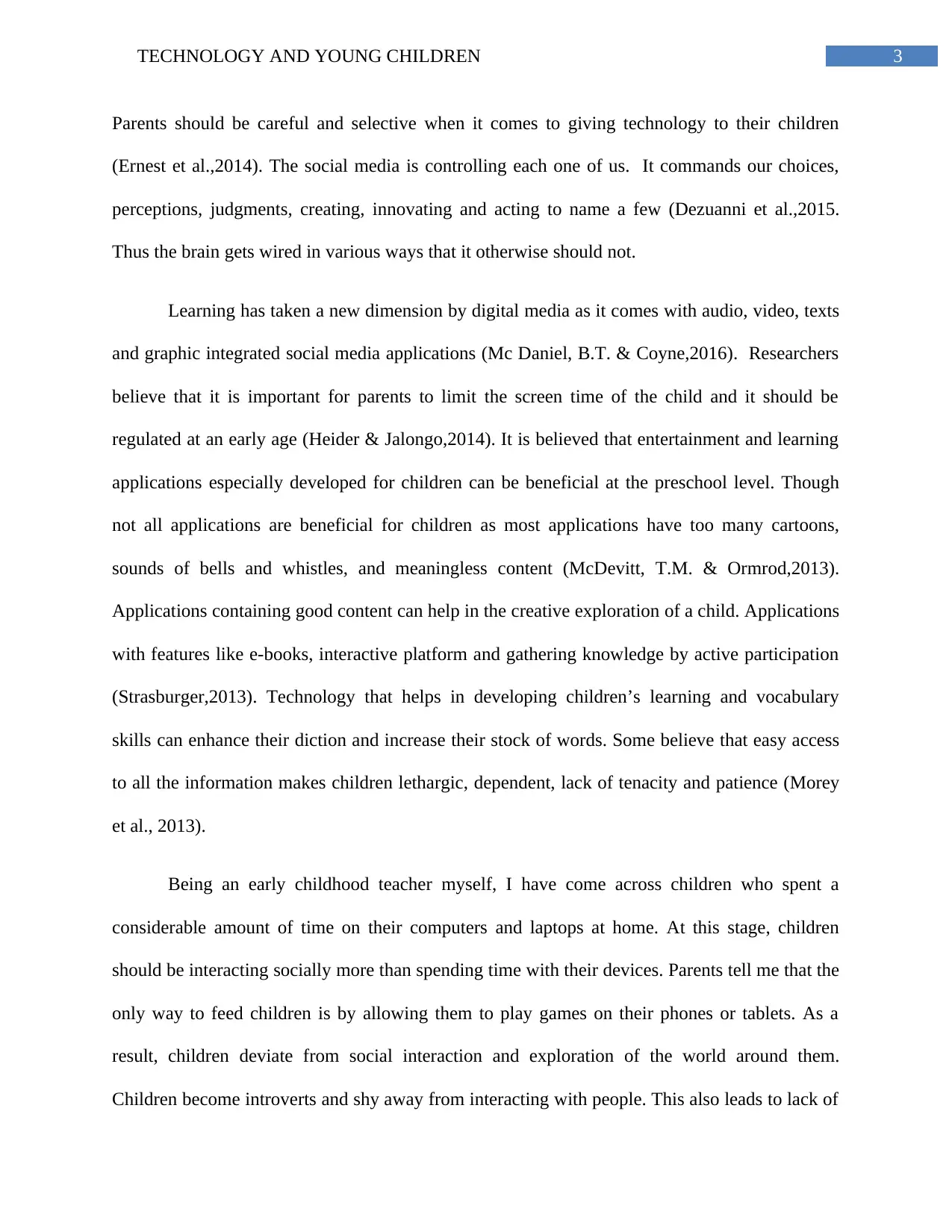
3TECHNOLOGY AND YOUNG CHILDREN
Parents should be careful and selective when it comes to giving technology to their children
(Ernest et al.,2014). The social media is controlling each one of us. It commands our choices,
perceptions, judgments, creating, innovating and acting to name a few (Dezuanni et al.,2015.
Thus the brain gets wired in various ways that it otherwise should not.
Learning has taken a new dimension by digital media as it comes with audio, video, texts
and graphic integrated social media applications (Mc Daniel, B.T. & Coyne,2016). Researchers
believe that it is important for parents to limit the screen time of the child and it should be
regulated at an early age (Heider & Jalongo,2014). It is believed that entertainment and learning
applications especially developed for children can be beneficial at the preschool level. Though
not all applications are beneficial for children as most applications have too many cartoons,
sounds of bells and whistles, and meaningless content (McDevitt, T.M. & Ormrod,2013).
Applications containing good content can help in the creative exploration of a child. Applications
with features like e-books, interactive platform and gathering knowledge by active participation
(Strasburger,2013). Technology that helps in developing children’s learning and vocabulary
skills can enhance their diction and increase their stock of words. Some believe that easy access
to all the information makes children lethargic, dependent, lack of tenacity and patience (Morey
et al., 2013).
Being an early childhood teacher myself, I have come across children who spent a
considerable amount of time on their computers and laptops at home. At this stage, children
should be interacting socially more than spending time with their devices. Parents tell me that the
only way to feed children is by allowing them to play games on their phones or tablets. As a
result, children deviate from social interaction and exploration of the world around them.
Children become introverts and shy away from interacting with people. This also leads to lack of
Parents should be careful and selective when it comes to giving technology to their children
(Ernest et al.,2014). The social media is controlling each one of us. It commands our choices,
perceptions, judgments, creating, innovating and acting to name a few (Dezuanni et al.,2015.
Thus the brain gets wired in various ways that it otherwise should not.
Learning has taken a new dimension by digital media as it comes with audio, video, texts
and graphic integrated social media applications (Mc Daniel, B.T. & Coyne,2016). Researchers
believe that it is important for parents to limit the screen time of the child and it should be
regulated at an early age (Heider & Jalongo,2014). It is believed that entertainment and learning
applications especially developed for children can be beneficial at the preschool level. Though
not all applications are beneficial for children as most applications have too many cartoons,
sounds of bells and whistles, and meaningless content (McDevitt, T.M. & Ormrod,2013).
Applications containing good content can help in the creative exploration of a child. Applications
with features like e-books, interactive platform and gathering knowledge by active participation
(Strasburger,2013). Technology that helps in developing children’s learning and vocabulary
skills can enhance their diction and increase their stock of words. Some believe that easy access
to all the information makes children lethargic, dependent, lack of tenacity and patience (Morey
et al., 2013).
Being an early childhood teacher myself, I have come across children who spent a
considerable amount of time on their computers and laptops at home. At this stage, children
should be interacting socially more than spending time with their devices. Parents tell me that the
only way to feed children is by allowing them to play games on their phones or tablets. As a
result, children deviate from social interaction and exploration of the world around them.
Children become introverts and shy away from interacting with people. This also leads to lack of
Paraphrase This Document
Need a fresh take? Get an instant paraphrase of this document with our AI Paraphraser
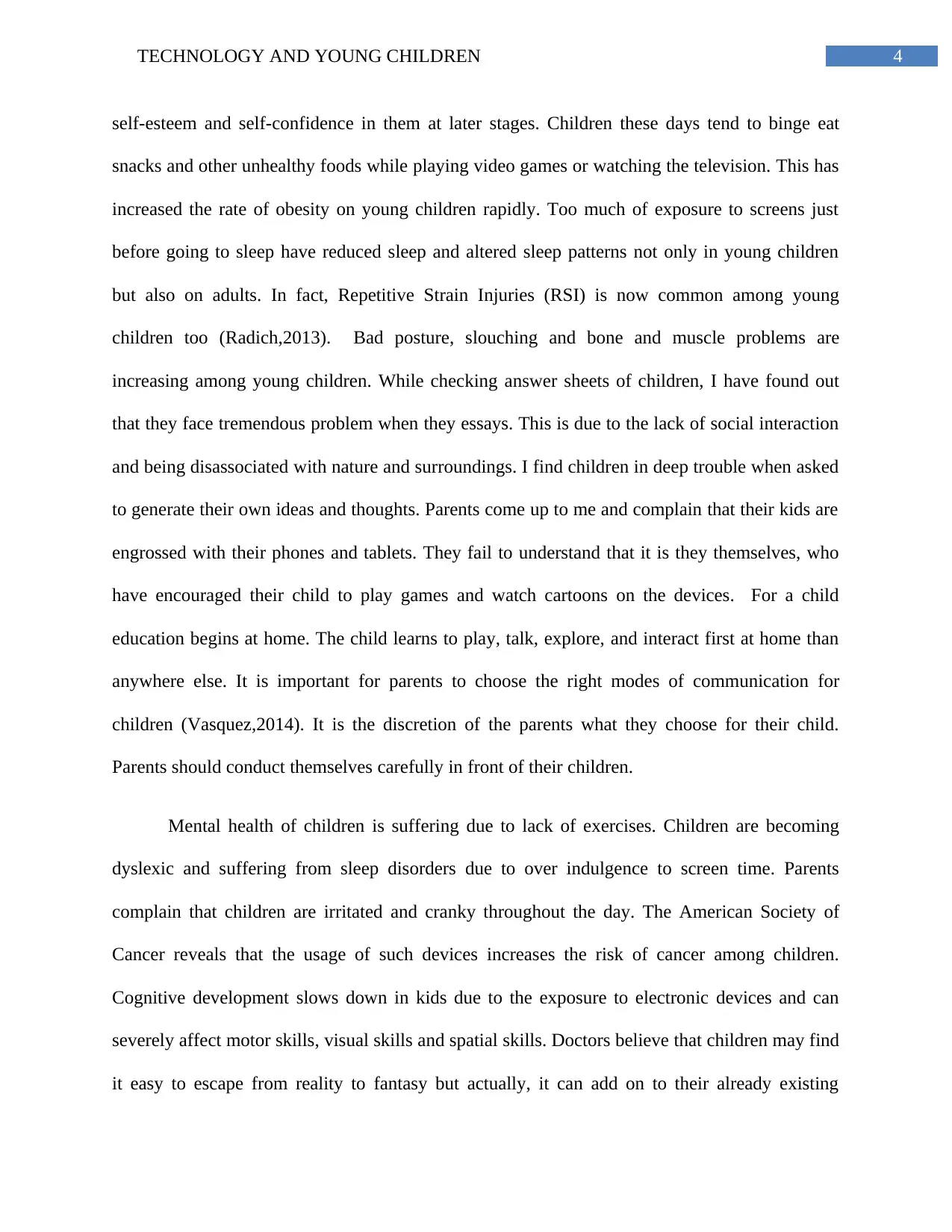
4TECHNOLOGY AND YOUNG CHILDREN
self-esteem and self-confidence in them at later stages. Children these days tend to binge eat
snacks and other unhealthy foods while playing video games or watching the television. This has
increased the rate of obesity on young children rapidly. Too much of exposure to screens just
before going to sleep have reduced sleep and altered sleep patterns not only in young children
but also on adults. In fact, Repetitive Strain Injuries (RSI) is now common among young
children too (Radich,2013). Bad posture, slouching and bone and muscle problems are
increasing among young children. While checking answer sheets of children, I have found out
that they face tremendous problem when they essays. This is due to the lack of social interaction
and being disassociated with nature and surroundings. I find children in deep trouble when asked
to generate their own ideas and thoughts. Parents come up to me and complain that their kids are
engrossed with their phones and tablets. They fail to understand that it is they themselves, who
have encouraged their child to play games and watch cartoons on the devices. For a child
education begins at home. The child learns to play, talk, explore, and interact first at home than
anywhere else. It is important for parents to choose the right modes of communication for
children (Vasquez,2014). It is the discretion of the parents what they choose for their child.
Parents should conduct themselves carefully in front of their children.
Mental health of children is suffering due to lack of exercises. Children are becoming
dyslexic and suffering from sleep disorders due to over indulgence to screen time. Parents
complain that children are irritated and cranky throughout the day. The American Society of
Cancer reveals that the usage of such devices increases the risk of cancer among children.
Cognitive development slows down in kids due to the exposure to electronic devices and can
severely affect motor skills, visual skills and spatial skills. Doctors believe that children may find
it easy to escape from reality to fantasy but actually, it can add on to their already existing
self-esteem and self-confidence in them at later stages. Children these days tend to binge eat
snacks and other unhealthy foods while playing video games or watching the television. This has
increased the rate of obesity on young children rapidly. Too much of exposure to screens just
before going to sleep have reduced sleep and altered sleep patterns not only in young children
but also on adults. In fact, Repetitive Strain Injuries (RSI) is now common among young
children too (Radich,2013). Bad posture, slouching and bone and muscle problems are
increasing among young children. While checking answer sheets of children, I have found out
that they face tremendous problem when they essays. This is due to the lack of social interaction
and being disassociated with nature and surroundings. I find children in deep trouble when asked
to generate their own ideas and thoughts. Parents come up to me and complain that their kids are
engrossed with their phones and tablets. They fail to understand that it is they themselves, who
have encouraged their child to play games and watch cartoons on the devices. For a child
education begins at home. The child learns to play, talk, explore, and interact first at home than
anywhere else. It is important for parents to choose the right modes of communication for
children (Vasquez,2014). It is the discretion of the parents what they choose for their child.
Parents should conduct themselves carefully in front of their children.
Mental health of children is suffering due to lack of exercises. Children are becoming
dyslexic and suffering from sleep disorders due to over indulgence to screen time. Parents
complain that children are irritated and cranky throughout the day. The American Society of
Cancer reveals that the usage of such devices increases the risk of cancer among children.
Cognitive development slows down in kids due to the exposure to electronic devices and can
severely affect motor skills, visual skills and spatial skills. Doctors believe that children may find
it easy to escape from reality to fantasy but actually, it can add on to their already existing
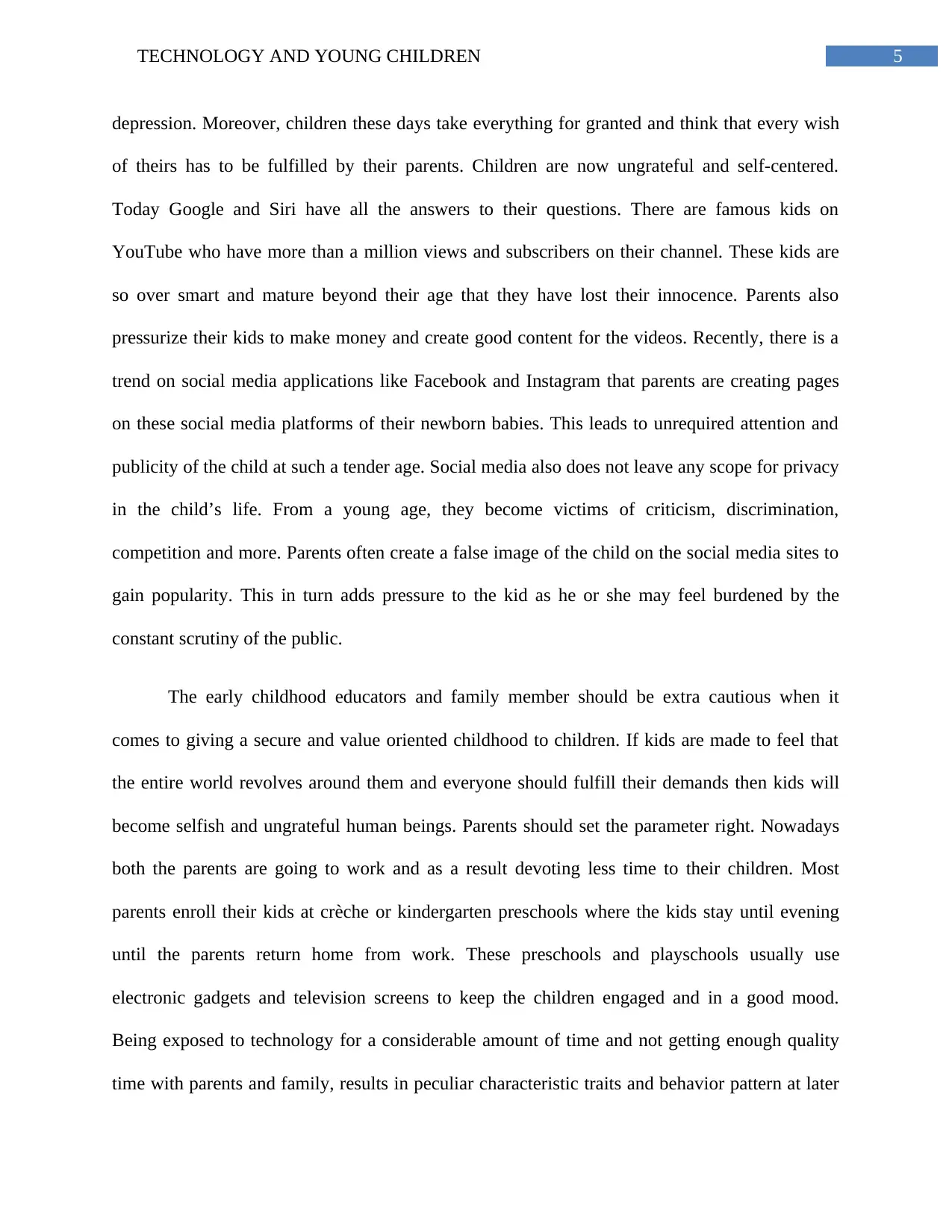
5TECHNOLOGY AND YOUNG CHILDREN
depression. Moreover, children these days take everything for granted and think that every wish
of theirs has to be fulfilled by their parents. Children are now ungrateful and self-centered.
Today Google and Siri have all the answers to their questions. There are famous kids on
YouTube who have more than a million views and subscribers on their channel. These kids are
so over smart and mature beyond their age that they have lost their innocence. Parents also
pressurize their kids to make money and create good content for the videos. Recently, there is a
trend on social media applications like Facebook and Instagram that parents are creating pages
on these social media platforms of their newborn babies. This leads to unrequired attention and
publicity of the child at such a tender age. Social media also does not leave any scope for privacy
in the child’s life. From a young age, they become victims of criticism, discrimination,
competition and more. Parents often create a false image of the child on the social media sites to
gain popularity. This in turn adds pressure to the kid as he or she may feel burdened by the
constant scrutiny of the public.
The early childhood educators and family member should be extra cautious when it
comes to giving a secure and value oriented childhood to children. If kids are made to feel that
the entire world revolves around them and everyone should fulfill their demands then kids will
become selfish and ungrateful human beings. Parents should set the parameter right. Nowadays
both the parents are going to work and as a result devoting less time to their children. Most
parents enroll their kids at crèche or kindergarten preschools where the kids stay until evening
until the parents return home from work. These preschools and playschools usually use
electronic gadgets and television screens to keep the children engaged and in a good mood.
Being exposed to technology for a considerable amount of time and not getting enough quality
time with parents and family, results in peculiar characteristic traits and behavior pattern at later
depression. Moreover, children these days take everything for granted and think that every wish
of theirs has to be fulfilled by their parents. Children are now ungrateful and self-centered.
Today Google and Siri have all the answers to their questions. There are famous kids on
YouTube who have more than a million views and subscribers on their channel. These kids are
so over smart and mature beyond their age that they have lost their innocence. Parents also
pressurize their kids to make money and create good content for the videos. Recently, there is a
trend on social media applications like Facebook and Instagram that parents are creating pages
on these social media platforms of their newborn babies. This leads to unrequired attention and
publicity of the child at such a tender age. Social media also does not leave any scope for privacy
in the child’s life. From a young age, they become victims of criticism, discrimination,
competition and more. Parents often create a false image of the child on the social media sites to
gain popularity. This in turn adds pressure to the kid as he or she may feel burdened by the
constant scrutiny of the public.
The early childhood educators and family member should be extra cautious when it
comes to giving a secure and value oriented childhood to children. If kids are made to feel that
the entire world revolves around them and everyone should fulfill their demands then kids will
become selfish and ungrateful human beings. Parents should set the parameter right. Nowadays
both the parents are going to work and as a result devoting less time to their children. Most
parents enroll their kids at crèche or kindergarten preschools where the kids stay until evening
until the parents return home from work. These preschools and playschools usually use
electronic gadgets and television screens to keep the children engaged and in a good mood.
Being exposed to technology for a considerable amount of time and not getting enough quality
time with parents and family, results in peculiar characteristic traits and behavior pattern at later
⊘ This is a preview!⊘
Do you want full access?
Subscribe today to unlock all pages.

Trusted by 1+ million students worldwide
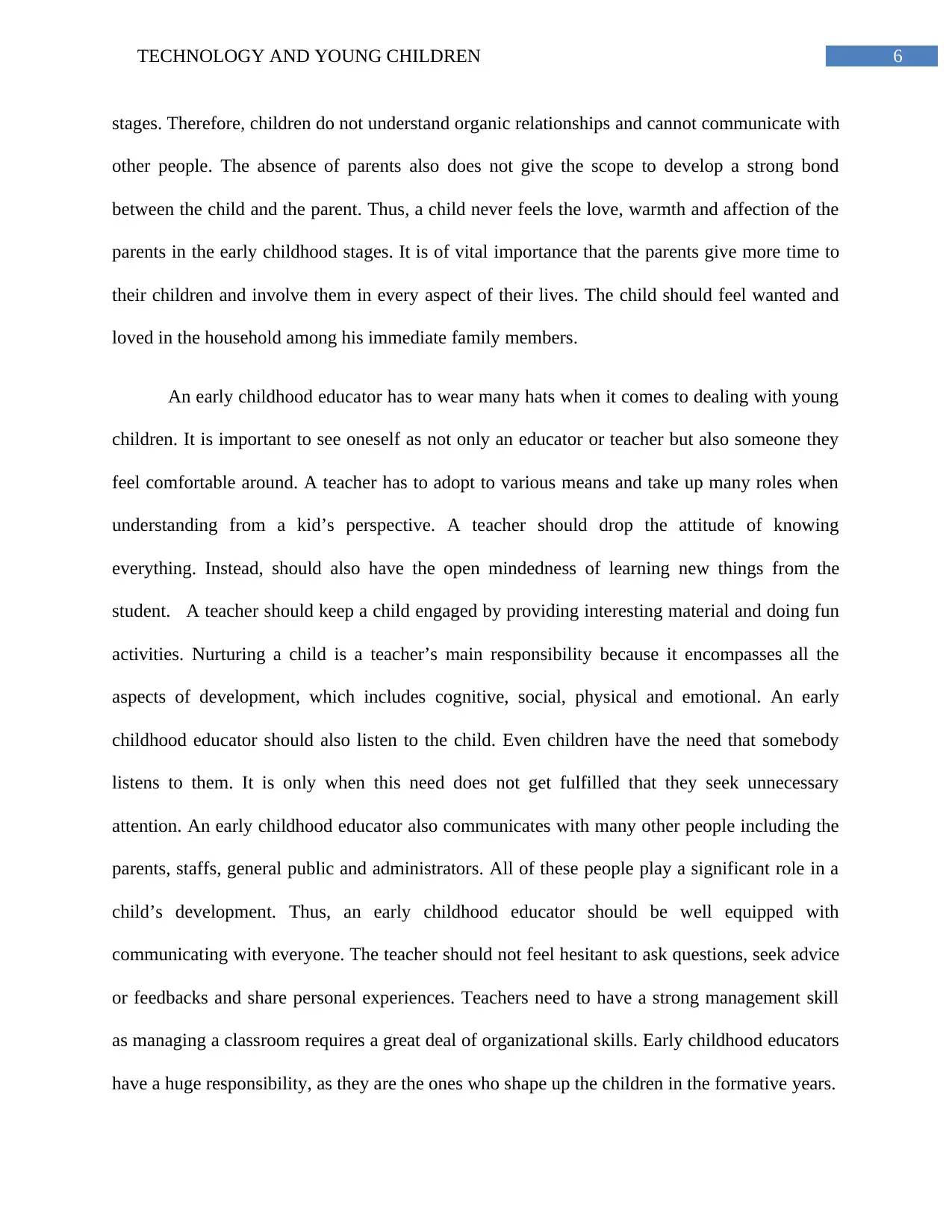
6TECHNOLOGY AND YOUNG CHILDREN
stages. Therefore, children do not understand organic relationships and cannot communicate with
other people. The absence of parents also does not give the scope to develop a strong bond
between the child and the parent. Thus, a child never feels the love, warmth and affection of the
parents in the early childhood stages. It is of vital importance that the parents give more time to
their children and involve them in every aspect of their lives. The child should feel wanted and
loved in the household among his immediate family members.
An early childhood educator has to wear many hats when it comes to dealing with young
children. It is important to see oneself as not only an educator or teacher but also someone they
feel comfortable around. A teacher has to adopt to various means and take up many roles when
understanding from a kid’s perspective. A teacher should drop the attitude of knowing
everything. Instead, should also have the open mindedness of learning new things from the
student. A teacher should keep a child engaged by providing interesting material and doing fun
activities. Nurturing a child is a teacher’s main responsibility because it encompasses all the
aspects of development, which includes cognitive, social, physical and emotional. An early
childhood educator should also listen to the child. Even children have the need that somebody
listens to them. It is only when this need does not get fulfilled that they seek unnecessary
attention. An early childhood educator also communicates with many other people including the
parents, staffs, general public and administrators. All of these people play a significant role in a
child’s development. Thus, an early childhood educator should be well equipped with
communicating with everyone. The teacher should not feel hesitant to ask questions, seek advice
or feedbacks and share personal experiences. Teachers need to have a strong management skill
as managing a classroom requires a great deal of organizational skills. Early childhood educators
have a huge responsibility, as they are the ones who shape up the children in the formative years.
stages. Therefore, children do not understand organic relationships and cannot communicate with
other people. The absence of parents also does not give the scope to develop a strong bond
between the child and the parent. Thus, a child never feels the love, warmth and affection of the
parents in the early childhood stages. It is of vital importance that the parents give more time to
their children and involve them in every aspect of their lives. The child should feel wanted and
loved in the household among his immediate family members.
An early childhood educator has to wear many hats when it comes to dealing with young
children. It is important to see oneself as not only an educator or teacher but also someone they
feel comfortable around. A teacher has to adopt to various means and take up many roles when
understanding from a kid’s perspective. A teacher should drop the attitude of knowing
everything. Instead, should also have the open mindedness of learning new things from the
student. A teacher should keep a child engaged by providing interesting material and doing fun
activities. Nurturing a child is a teacher’s main responsibility because it encompasses all the
aspects of development, which includes cognitive, social, physical and emotional. An early
childhood educator should also listen to the child. Even children have the need that somebody
listens to them. It is only when this need does not get fulfilled that they seek unnecessary
attention. An early childhood educator also communicates with many other people including the
parents, staffs, general public and administrators. All of these people play a significant role in a
child’s development. Thus, an early childhood educator should be well equipped with
communicating with everyone. The teacher should not feel hesitant to ask questions, seek advice
or feedbacks and share personal experiences. Teachers need to have a strong management skill
as managing a classroom requires a great deal of organizational skills. Early childhood educators
have a huge responsibility, as they are the ones who shape up the children in the formative years.
Paraphrase This Document
Need a fresh take? Get an instant paraphrase of this document with our AI Paraphraser
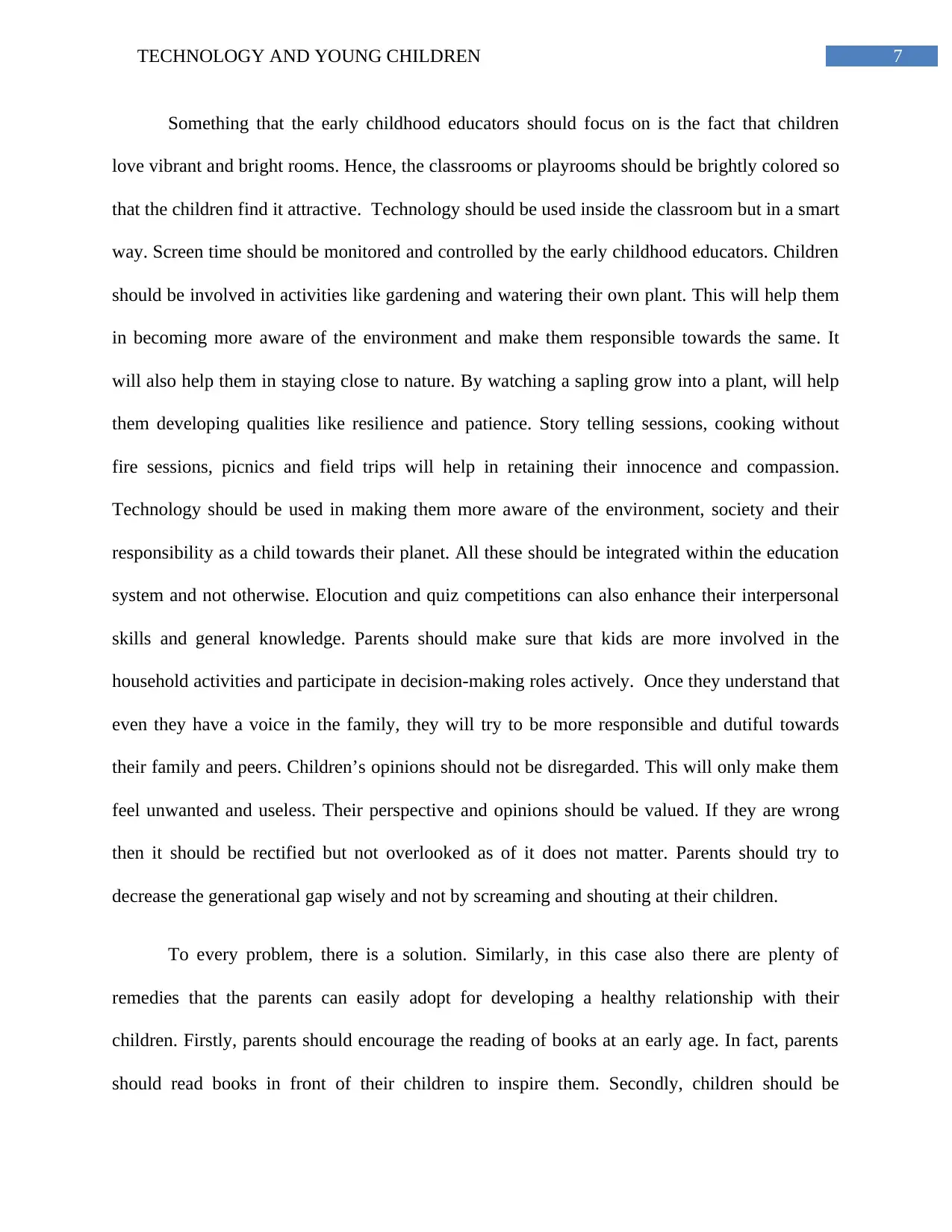
7TECHNOLOGY AND YOUNG CHILDREN
Something that the early childhood educators should focus on is the fact that children
love vibrant and bright rooms. Hence, the classrooms or playrooms should be brightly colored so
that the children find it attractive. Technology should be used inside the classroom but in a smart
way. Screen time should be monitored and controlled by the early childhood educators. Children
should be involved in activities like gardening and watering their own plant. This will help them
in becoming more aware of the environment and make them responsible towards the same. It
will also help them in staying close to nature. By watching a sapling grow into a plant, will help
them developing qualities like resilience and patience. Story telling sessions, cooking without
fire sessions, picnics and field trips will help in retaining their innocence and compassion.
Technology should be used in making them more aware of the environment, society and their
responsibility as a child towards their planet. All these should be integrated within the education
system and not otherwise. Elocution and quiz competitions can also enhance their interpersonal
skills and general knowledge. Parents should make sure that kids are more involved in the
household activities and participate in decision-making roles actively. Once they understand that
even they have a voice in the family, they will try to be more responsible and dutiful towards
their family and peers. Children’s opinions should not be disregarded. This will only make them
feel unwanted and useless. Their perspective and opinions should be valued. If they are wrong
then it should be rectified but not overlooked as of it does not matter. Parents should try to
decrease the generational gap wisely and not by screaming and shouting at their children.
To every problem, there is a solution. Similarly, in this case also there are plenty of
remedies that the parents can easily adopt for developing a healthy relationship with their
children. Firstly, parents should encourage the reading of books at an early age. In fact, parents
should read books in front of their children to inspire them. Secondly, children should be
Something that the early childhood educators should focus on is the fact that children
love vibrant and bright rooms. Hence, the classrooms or playrooms should be brightly colored so
that the children find it attractive. Technology should be used inside the classroom but in a smart
way. Screen time should be monitored and controlled by the early childhood educators. Children
should be involved in activities like gardening and watering their own plant. This will help them
in becoming more aware of the environment and make them responsible towards the same. It
will also help them in staying close to nature. By watching a sapling grow into a plant, will help
them developing qualities like resilience and patience. Story telling sessions, cooking without
fire sessions, picnics and field trips will help in retaining their innocence and compassion.
Technology should be used in making them more aware of the environment, society and their
responsibility as a child towards their planet. All these should be integrated within the education
system and not otherwise. Elocution and quiz competitions can also enhance their interpersonal
skills and general knowledge. Parents should make sure that kids are more involved in the
household activities and participate in decision-making roles actively. Once they understand that
even they have a voice in the family, they will try to be more responsible and dutiful towards
their family and peers. Children’s opinions should not be disregarded. This will only make them
feel unwanted and useless. Their perspective and opinions should be valued. If they are wrong
then it should be rectified but not overlooked as of it does not matter. Parents should try to
decrease the generational gap wisely and not by screaming and shouting at their children.
To every problem, there is a solution. Similarly, in this case also there are plenty of
remedies that the parents can easily adopt for developing a healthy relationship with their
children. Firstly, parents should encourage the reading of books at an early age. In fact, parents
should read books in front of their children to inspire them. Secondly, children should be
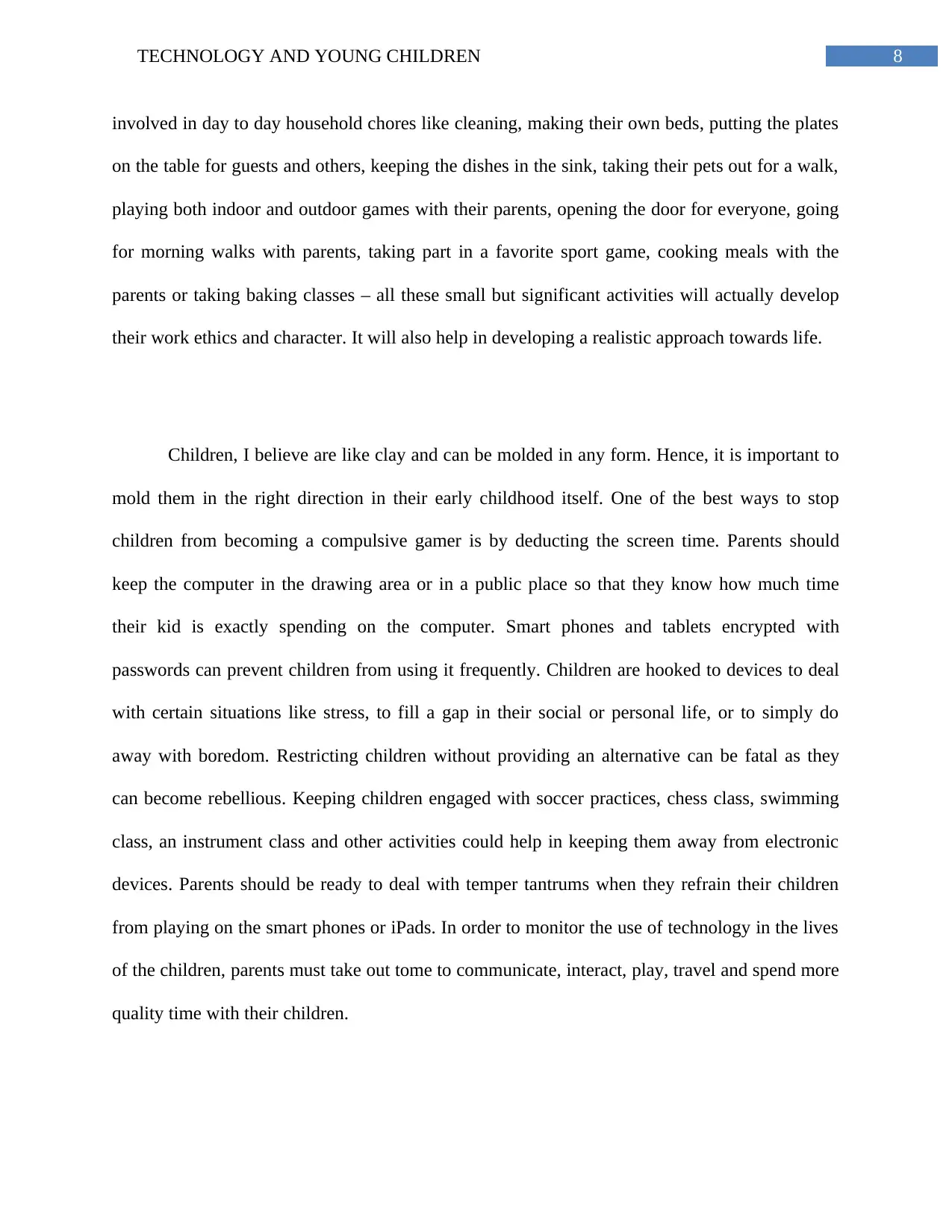
8TECHNOLOGY AND YOUNG CHILDREN
involved in day to day household chores like cleaning, making their own beds, putting the plates
on the table for guests and others, keeping the dishes in the sink, taking their pets out for a walk,
playing both indoor and outdoor games with their parents, opening the door for everyone, going
for morning walks with parents, taking part in a favorite sport game, cooking meals with the
parents or taking baking classes – all these small but significant activities will actually develop
their work ethics and character. It will also help in developing a realistic approach towards life.
Children, I believe are like clay and can be molded in any form. Hence, it is important to
mold them in the right direction in their early childhood itself. One of the best ways to stop
children from becoming a compulsive gamer is by deducting the screen time. Parents should
keep the computer in the drawing area or in a public place so that they know how much time
their kid is exactly spending on the computer. Smart phones and tablets encrypted with
passwords can prevent children from using it frequently. Children are hooked to devices to deal
with certain situations like stress, to fill a gap in their social or personal life, or to simply do
away with boredom. Restricting children without providing an alternative can be fatal as they
can become rebellious. Keeping children engaged with soccer practices, chess class, swimming
class, an instrument class and other activities could help in keeping them away from electronic
devices. Parents should be ready to deal with temper tantrums when they refrain their children
from playing on the smart phones or iPads. In order to monitor the use of technology in the lives
of the children, parents must take out tome to communicate, interact, play, travel and spend more
quality time with their children.
involved in day to day household chores like cleaning, making their own beds, putting the plates
on the table for guests and others, keeping the dishes in the sink, taking their pets out for a walk,
playing both indoor and outdoor games with their parents, opening the door for everyone, going
for morning walks with parents, taking part in a favorite sport game, cooking meals with the
parents or taking baking classes – all these small but significant activities will actually develop
their work ethics and character. It will also help in developing a realistic approach towards life.
Children, I believe are like clay and can be molded in any form. Hence, it is important to
mold them in the right direction in their early childhood itself. One of the best ways to stop
children from becoming a compulsive gamer is by deducting the screen time. Parents should
keep the computer in the drawing area or in a public place so that they know how much time
their kid is exactly spending on the computer. Smart phones and tablets encrypted with
passwords can prevent children from using it frequently. Children are hooked to devices to deal
with certain situations like stress, to fill a gap in their social or personal life, or to simply do
away with boredom. Restricting children without providing an alternative can be fatal as they
can become rebellious. Keeping children engaged with soccer practices, chess class, swimming
class, an instrument class and other activities could help in keeping them away from electronic
devices. Parents should be ready to deal with temper tantrums when they refrain their children
from playing on the smart phones or iPads. In order to monitor the use of technology in the lives
of the children, parents must take out tome to communicate, interact, play, travel and spend more
quality time with their children.
⊘ This is a preview!⊘
Do you want full access?
Subscribe today to unlock all pages.

Trusted by 1+ million students worldwide
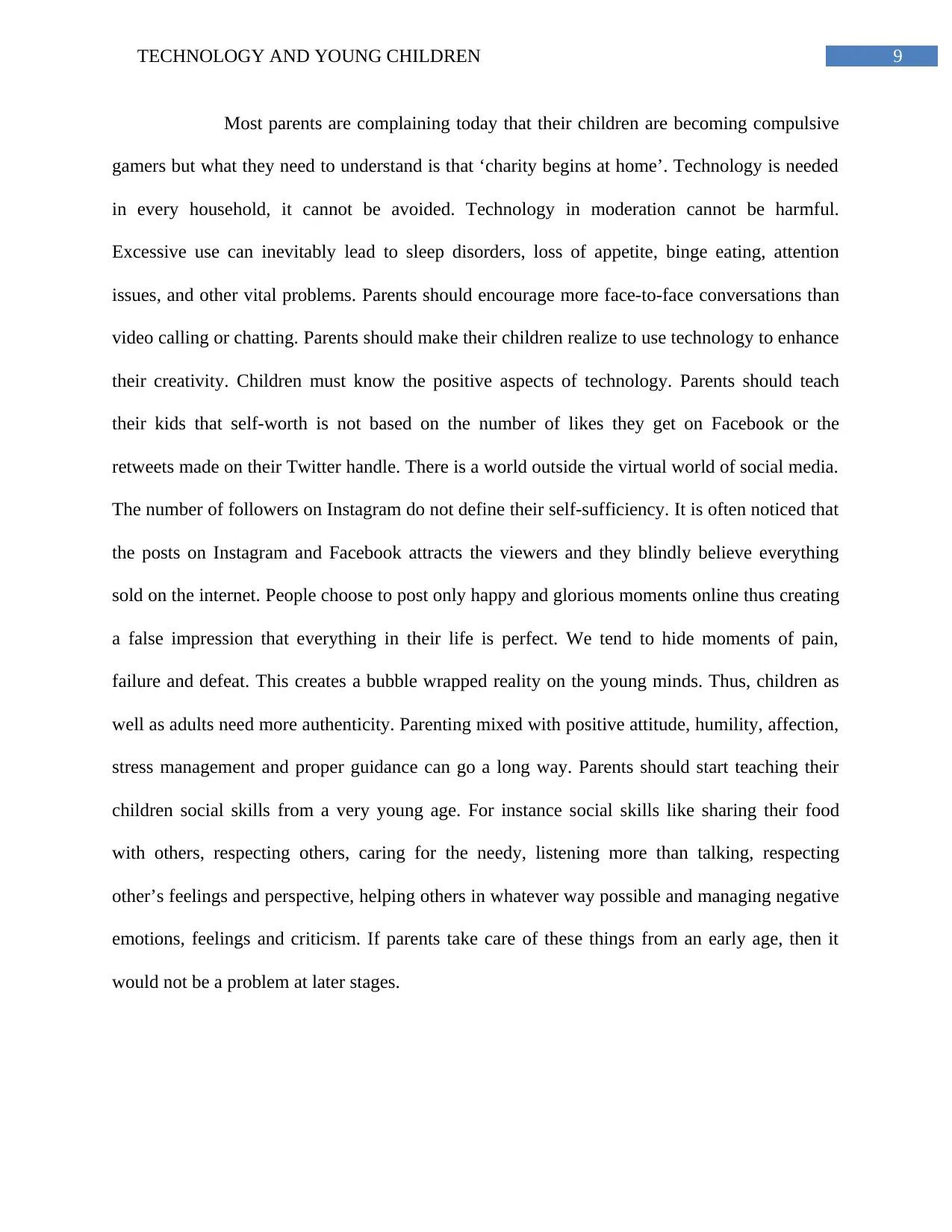
9TECHNOLOGY AND YOUNG CHILDREN
Most parents are complaining today that their children are becoming compulsive
gamers but what they need to understand is that ‘charity begins at home’. Technology is needed
in every household, it cannot be avoided. Technology in moderation cannot be harmful.
Excessive use can inevitably lead to sleep disorders, loss of appetite, binge eating, attention
issues, and other vital problems. Parents should encourage more face-to-face conversations than
video calling or chatting. Parents should make their children realize to use technology to enhance
their creativity. Children must know the positive aspects of technology. Parents should teach
their kids that self-worth is not based on the number of likes they get on Facebook or the
retweets made on their Twitter handle. There is a world outside the virtual world of social media.
The number of followers on Instagram do not define their self-sufficiency. It is often noticed that
the posts on Instagram and Facebook attracts the viewers and they blindly believe everything
sold on the internet. People choose to post only happy and glorious moments online thus creating
a false impression that everything in their life is perfect. We tend to hide moments of pain,
failure and defeat. This creates a bubble wrapped reality on the young minds. Thus, children as
well as adults need more authenticity. Parenting mixed with positive attitude, humility, affection,
stress management and proper guidance can go a long way. Parents should start teaching their
children social skills from a very young age. For instance social skills like sharing their food
with others, respecting others, caring for the needy, listening more than talking, respecting
other’s feelings and perspective, helping others in whatever way possible and managing negative
emotions, feelings and criticism. If parents take care of these things from an early age, then it
would not be a problem at later stages.
Most parents are complaining today that their children are becoming compulsive
gamers but what they need to understand is that ‘charity begins at home’. Technology is needed
in every household, it cannot be avoided. Technology in moderation cannot be harmful.
Excessive use can inevitably lead to sleep disorders, loss of appetite, binge eating, attention
issues, and other vital problems. Parents should encourage more face-to-face conversations than
video calling or chatting. Parents should make their children realize to use technology to enhance
their creativity. Children must know the positive aspects of technology. Parents should teach
their kids that self-worth is not based on the number of likes they get on Facebook or the
retweets made on their Twitter handle. There is a world outside the virtual world of social media.
The number of followers on Instagram do not define their self-sufficiency. It is often noticed that
the posts on Instagram and Facebook attracts the viewers and they blindly believe everything
sold on the internet. People choose to post only happy and glorious moments online thus creating
a false impression that everything in their life is perfect. We tend to hide moments of pain,
failure and defeat. This creates a bubble wrapped reality on the young minds. Thus, children as
well as adults need more authenticity. Parenting mixed with positive attitude, humility, affection,
stress management and proper guidance can go a long way. Parents should start teaching their
children social skills from a very young age. For instance social skills like sharing their food
with others, respecting others, caring for the needy, listening more than talking, respecting
other’s feelings and perspective, helping others in whatever way possible and managing negative
emotions, feelings and criticism. If parents take care of these things from an early age, then it
would not be a problem at later stages.
Paraphrase This Document
Need a fresh take? Get an instant paraphrase of this document with our AI Paraphraser
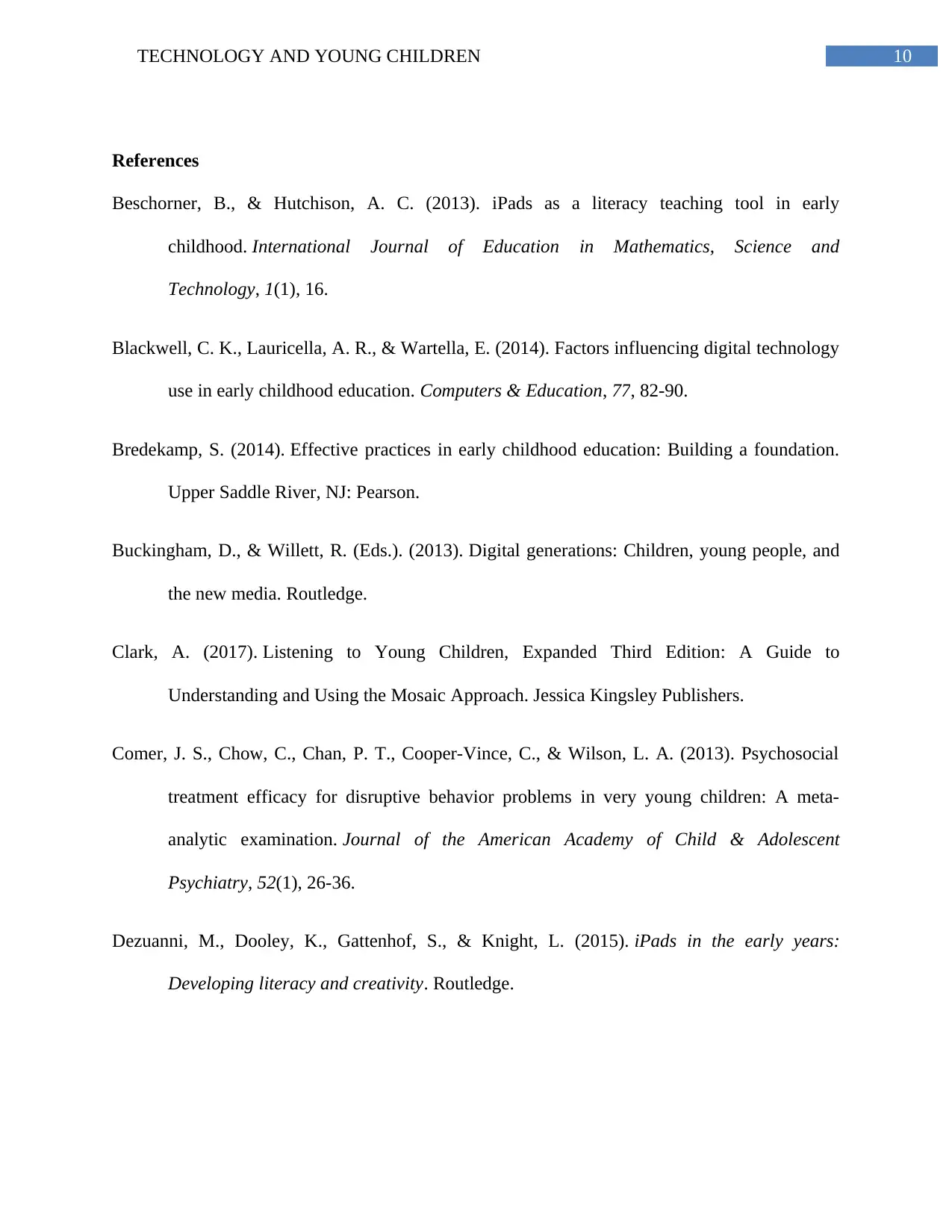
10TECHNOLOGY AND YOUNG CHILDREN
References
Beschorner, B., & Hutchison, A. C. (2013). iPads as a literacy teaching tool in early
childhood. International Journal of Education in Mathematics, Science and
Technology, 1(1), 16.
Blackwell, C. K., Lauricella, A. R., & Wartella, E. (2014). Factors influencing digital technology
use in early childhood education. Computers & Education, 77, 82-90.
Bredekamp, S. (2014). Effective practices in early childhood education: Building a foundation.
Upper Saddle River, NJ: Pearson.
Buckingham, D., & Willett, R. (Eds.). (2013). Digital generations: Children, young people, and
the new media. Routledge.
Clark, A. (2017). Listening to Young Children, Expanded Third Edition: A Guide to
Understanding and Using the Mosaic Approach. Jessica Kingsley Publishers.
Comer, J. S., Chow, C., Chan, P. T., Cooper-Vince, C., & Wilson, L. A. (2013). Psychosocial
treatment efficacy for disruptive behavior problems in very young children: A meta-
analytic examination. Journal of the American Academy of Child & Adolescent
Psychiatry, 52(1), 26-36.
Dezuanni, M., Dooley, K., Gattenhof, S., & Knight, L. (2015). iPads in the early years:
Developing literacy and creativity. Routledge.
References
Beschorner, B., & Hutchison, A. C. (2013). iPads as a literacy teaching tool in early
childhood. International Journal of Education in Mathematics, Science and
Technology, 1(1), 16.
Blackwell, C. K., Lauricella, A. R., & Wartella, E. (2014). Factors influencing digital technology
use in early childhood education. Computers & Education, 77, 82-90.
Bredekamp, S. (2014). Effective practices in early childhood education: Building a foundation.
Upper Saddle River, NJ: Pearson.
Buckingham, D., & Willett, R. (Eds.). (2013). Digital generations: Children, young people, and
the new media. Routledge.
Clark, A. (2017). Listening to Young Children, Expanded Third Edition: A Guide to
Understanding and Using the Mosaic Approach. Jessica Kingsley Publishers.
Comer, J. S., Chow, C., Chan, P. T., Cooper-Vince, C., & Wilson, L. A. (2013). Psychosocial
treatment efficacy for disruptive behavior problems in very young children: A meta-
analytic examination. Journal of the American Academy of Child & Adolescent
Psychiatry, 52(1), 26-36.
Dezuanni, M., Dooley, K., Gattenhof, S., & Knight, L. (2015). iPads in the early years:
Developing literacy and creativity. Routledge.
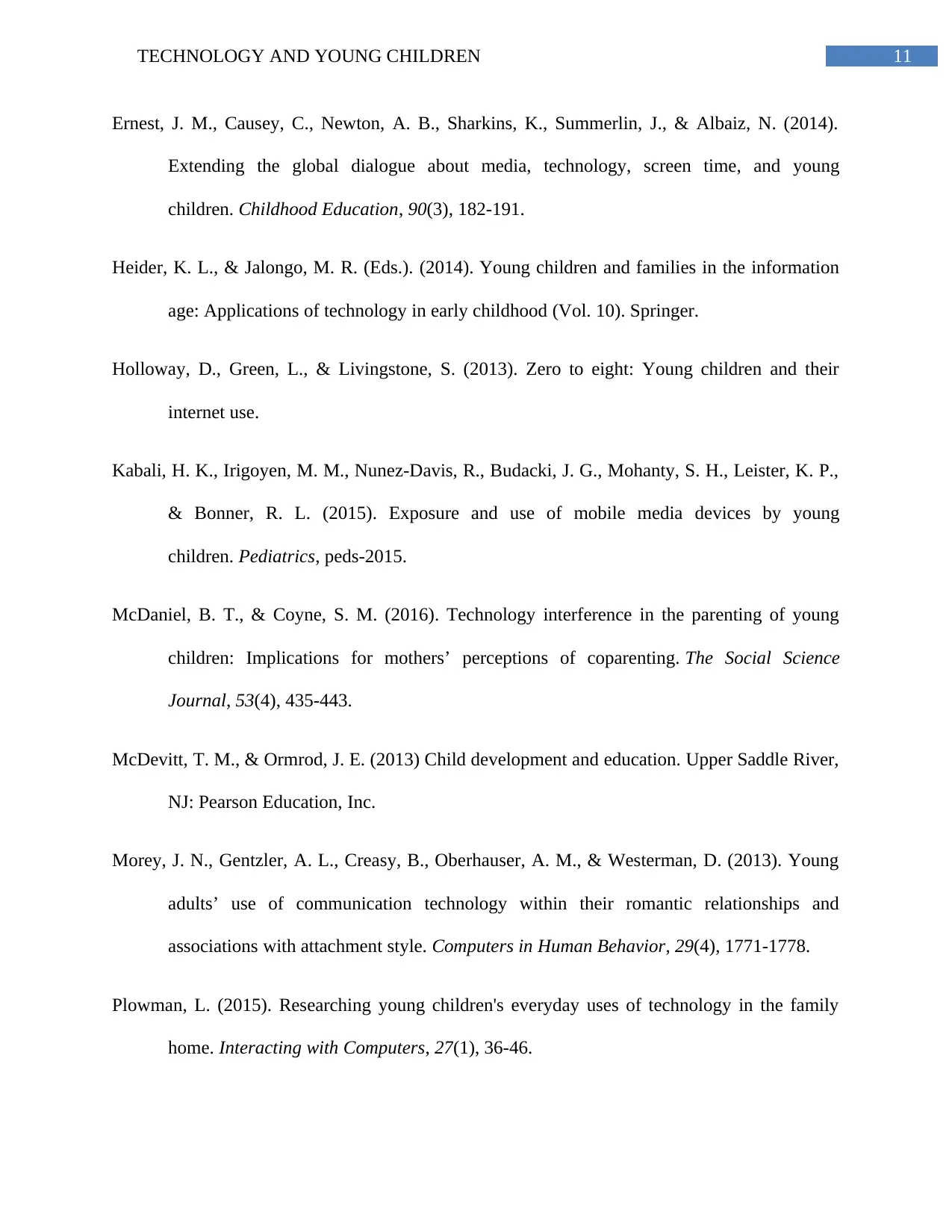
11TECHNOLOGY AND YOUNG CHILDREN
Ernest, J. M., Causey, C., Newton, A. B., Sharkins, K., Summerlin, J., & Albaiz, N. (2014).
Extending the global dialogue about media, technology, screen time, and young
children. Childhood Education, 90(3), 182-191.
Heider, K. L., & Jalongo, M. R. (Eds.). (2014). Young children and families in the information
age: Applications of technology in early childhood (Vol. 10). Springer.
Holloway, D., Green, L., & Livingstone, S. (2013). Zero to eight: Young children and their
internet use.
Kabali, H. K., Irigoyen, M. M., Nunez-Davis, R., Budacki, J. G., Mohanty, S. H., Leister, K. P.,
& Bonner, R. L. (2015). Exposure and use of mobile media devices by young
children. Pediatrics, peds-2015.
McDaniel, B. T., & Coyne, S. M. (2016). Technology interference in the parenting of young
children: Implications for mothers’ perceptions of coparenting. The Social Science
Journal, 53(4), 435-443.
McDevitt, T. M., & Ormrod, J. E. (2013) Child development and education. Upper Saddle River,
NJ: Pearson Education, Inc.
Morey, J. N., Gentzler, A. L., Creasy, B., Oberhauser, A. M., & Westerman, D. (2013). Young
adults’ use of communication technology within their romantic relationships and
associations with attachment style. Computers in Human Behavior, 29(4), 1771-1778.
Plowman, L. (2015). Researching young children's everyday uses of technology in the family
home. Interacting with Computers, 27(1), 36-46.
Ernest, J. M., Causey, C., Newton, A. B., Sharkins, K., Summerlin, J., & Albaiz, N. (2014).
Extending the global dialogue about media, technology, screen time, and young
children. Childhood Education, 90(3), 182-191.
Heider, K. L., & Jalongo, M. R. (Eds.). (2014). Young children and families in the information
age: Applications of technology in early childhood (Vol. 10). Springer.
Holloway, D., Green, L., & Livingstone, S. (2013). Zero to eight: Young children and their
internet use.
Kabali, H. K., Irigoyen, M. M., Nunez-Davis, R., Budacki, J. G., Mohanty, S. H., Leister, K. P.,
& Bonner, R. L. (2015). Exposure and use of mobile media devices by young
children. Pediatrics, peds-2015.
McDaniel, B. T., & Coyne, S. M. (2016). Technology interference in the parenting of young
children: Implications for mothers’ perceptions of coparenting. The Social Science
Journal, 53(4), 435-443.
McDevitt, T. M., & Ormrod, J. E. (2013) Child development and education. Upper Saddle River,
NJ: Pearson Education, Inc.
Morey, J. N., Gentzler, A. L., Creasy, B., Oberhauser, A. M., & Westerman, D. (2013). Young
adults’ use of communication technology within their romantic relationships and
associations with attachment style. Computers in Human Behavior, 29(4), 1771-1778.
Plowman, L. (2015). Researching young children's everyday uses of technology in the family
home. Interacting with Computers, 27(1), 36-46.
⊘ This is a preview!⊘
Do you want full access?
Subscribe today to unlock all pages.

Trusted by 1+ million students worldwide
1 out of 13
Related Documents
Your All-in-One AI-Powered Toolkit for Academic Success.
+13062052269
info@desklib.com
Available 24*7 on WhatsApp / Email
![[object Object]](/_next/static/media/star-bottom.7253800d.svg)
Unlock your academic potential
Copyright © 2020–2026 A2Z Services. All Rights Reserved. Developed and managed by ZUCOL.





